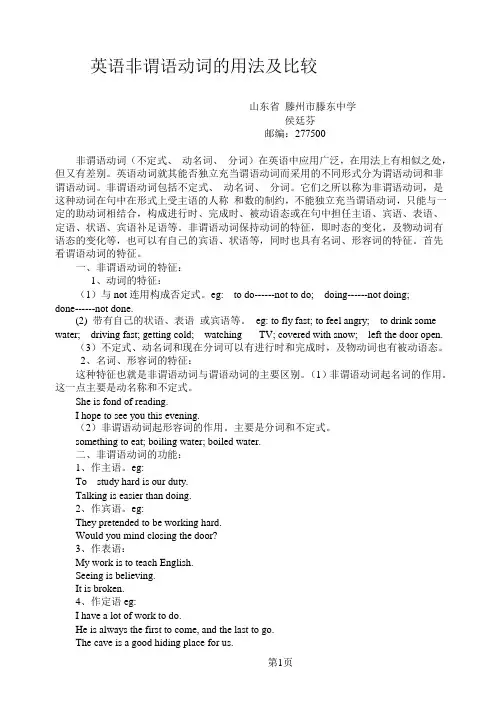非谓语动词用法辨析
非谓语动词用法辨析 教案

非谓语动词用法辨析(一)非谓语动词在句中的成分不定式几乎可以充当除谓语以外的所有成分,动名词起名词的作用。
现在分词和过去分词起形容词和副词的作用。
(二)非谓语动词在同一成分中用法的辨析1.做主语:-般来说,不定式和动名词成份相同时,表示客观性、一般性行为为多用动名词表示,而表示一次性、具体性行为则多用不定式。
Looking after children is her job.To clean the classroom is his job today.2.做宾语:I like swimming, but I don't like to swim today because I don't feel well.(1).有些动词只能接不定式做宾语,这些动词接上不定式,含有明显的主观性和将来性意义。
如:help,hope,ask,refuse,decide,promise,wish,pretend,expect,arrange,learn,plan,demand,dare,manage,agree,prepare,fail,determine,offer,choose,desire,elect,long,(happen,seem),等等。
He refused to speak on the radio.He desired to see you.(2)..有些动词只接动名词做宾语,这些动词接上动名词,含有明显的"依据往事或经验来作出理解和判断"的意思。
mind,finish,enjoy,suggest,permit,appreciate,consider,miss,dislike,keep(on),avoid,permit,imagine,risk,escape,admit,stand(忍受),allow,forbid,excuse,等等。
短语动词:give up,put off,look forward to,feel like,insist on,object to,prevent…from,set about,can't help,be/get used to等短语:be worth doing,be no good doing,be no use doing,be busy doing等The mother did agree to let the boy risk swimming across the river.She can't stand having nothing to do at home.His wife doesn't allow smoking inside the room and often advised him to give up smoking.All the family insisted on my staying with them a few days longer.It's no good learning without practicing.I'm looking forward to hearing from you soon.She doesn't feel like eating anything,being ill for a few days.(3).有些动词后面既可接不定式,又可接动名词,其意义基本相同,区别不大。
非谓语动词的区别与用法

非谓语动词的区别与用法在英语学习中,非谓语动词一直是一个重点和难点。
非谓语动词包括动词不定式(to do)、动名词(doing)和分词(现在分词 doing 和过去分词 done)。
它们在句子中不充当谓语,但却有着丰富的用法和重要的作用。
首先,我们来看看动词不定式。
动词不定式具有名词、形容词和副词的特征,可以在句子中充当主语、宾语、定语、状语、宾语补足语等成分。
作主语时,常常将其放在句尾,而用 it 作形式主语。
比如:“It is important to learn English well”(学好英语很重要。
)这样的表达可以避免句子头重脚轻。
作宾语时,常见的动词有 want, hope, decide 等。
例如:“I want to go shopping this afternoon”(今天下午我想去购物。
)作定语时,通常放在被修饰的名词之后。
像“The best way to solve the problem is to work hard”(解决这个问题的最好办法是努力工作。
)作状语时,可以表示目的、结果、原因等。
“He came here to see me”(他来这儿是为了看我。
)这里就是表示目的。
作宾语补足语时,比如:“The teacher asked us to clean the classroom”(老师让我们打扫教室。
)接下来是动名词。
动名词具有名词的特征,在句中可以充当主语、宾语、定语等成分。
作主语时,谓语动词要用单数形式。
例如:“Swimming is good for your health”(游泳对你的健康有好处。
)作宾语时,常见的动词有 enjoy, finish, practice 等。
比如:“I enjoy reading book s in my spare time”(我业余时间喜欢读书。
)作定语时,通常表示被修饰词的用途。
“A swimming pool”(游泳池),这里的“swimming”就表示“pool”的用途。
非谓语动词用法比较详析

4、现在分词作表语表示主动概念,过去分词作表语表示被动概念 。如:
They were deeply moved to hear the old man’s story. 听到老 人的故事,他们被深深地打动了。 What he said isn’t interesting at all. 他的讲话一点也没有趣。
I really regret missing/having missed his lecture. 我没能听他 的讲座真感到遗憾。 I regret to tell you that I cannot come. 真遗憾,告诉你我不能来 了。
(3)can’t help: can’t help doing sth.禁不住;can’t help (to) do sth. 不能帮忙干…
I was teaching the children maths when you passed by. 你经 过时我正教孩子数学。 (进行时态) What you teach is very interesing. 你所教的科目很有趣。 ( 分词式形容词) 四、不定式、动名词作宾语的区别
这类动词用不定式作宾语往往指具体的或一次性的行为,而动 词的-ing形式则指概括性、经常性的动作或体验。这类动词常用的 有:
He tried to stand up but failed. 他试图站起来,但没成功。 Let’s try telling him about the sad news. 咱们试着把这个不幸的 消息告诉他。
(2)regret: regret to do sth. 对马上要做的事表示遗憾;regret doing sth.对已发生的事表示遗憾或后悔。
非谓语动词的三种形式及用法区别

非谓语动词的三种形式及用法区别一、非谓语动词的三种形式:1. 动词-ing形式:动词-ing形式具有动名词的功能,一般用来表示一个正在进行或发生的动作,以及被动含义,等。
比如:He was observed walking along the street. 他被观察到沿着街道走。
2. 动词不定式形式:动词不定式具有名词、形容词和动词的功能,常用来表示目的、动机、结果、条件、时间、让步等。
比如:To face the danger bravely is his duty. 勇敢的去面对危险是他的责任。
3. 动词的过去分词形式:动词的过去分词常用来表示完成或发生过的动作或状态,以及主句的谓语动词的被动的形式,常用结构有:Be + done/past participle (被动),Have/Get + done(完成).比如:The machine is now ready to be used. 这台机器现在准备好被使用了。
二、非谓语动词的用法区别:1. 动词-ing形式:(1) 用作定语:形容词性短语作定语修饰名词或代词,如:He was aman working hard. 他是个努力工作的人。
(2) 用作表语:Ing 形式的短语作表语,表示一个正在进行的动作或状态,如:His job is repairing the machine. 他的工作是修理机器。
2. 动词不定式形式:(1) 作宾补:动词不定式作宾补表示“目的”,“动机”,“结果”,“条件”,“时间”,“让步”等。
如:He came here to do something for us. 他来这里为我们做一些事情。
(2) 作状语:动词不定式作状语,表示“目的”,“动机”,“条件”,“时间”,“让步”等。
如:She always goes out for a walk to relax herself. 她总是出去散步来放松自己。
非谓语动词用法详解

非谓语动词用法详解动词的非谓语形式有三种:不定式、动名词和分词(一)不定式不定式由“to十动词原形”构成,其否定形式是“not to do”.不定式可以带宾语或状语构成不定式短语,没有人称和数的变化,但有时态和语态的变化.不定式可作主语、宾语、状语、表语和定语,但不能单独作谓语.不定式的逻辑主语有时用“for十名词或代词宾格”构成.1.不定式的用法:l)作主语.不定式短语作主语时,往往放在谓语之后,用it作形式主语.例如:To see is to believe.It is right to give up smoking.2)作宾语.不定式短语作宾语时,如果还带有宾语补足语。
往往把不定式宾语放在宾语补足语之后,而用it作形式宾语.例如:He wanted to go.I find it interesting to study work with him.3)作宾语补足语.例如:He asked me to do the work with him.注意:在feel,hear,listen to,look at,notice, observe,see,watch,have, let,make等词后的补足语中,不定式不带to.但是这些句子如果变成被动结构时,就必须带to.例如I often hear him sing the song.He is often heard to sing the song.注意:不定式动词在介词but,except,besides后面时,如果这些介词之前有行为动词do的各种形式,那么,这些介词后的不定式不带to,否则要带to.如:She could do nothing but cry.What do you like to do besides swim?I have no choice but to go.动词help之后,带to或不带to都可以。
Will you please help me (to) take this suitcase? 请你帮我提一下这个衣箱好吗?She often helps her mother (to) clean their house. 她经常帮助她妈妈打扫房子。
英语非谓语动词的用法及比较

英语非谓语动词的用法及比较山东省滕州市滕东中学侯廷芬邮编:277500非谓语动词(不定式、动名词、分词)在英语中应用广泛,在用法上有相似之处,但又有差别。
英语动词就其能否独立充当谓语动词而采用的不同形式分为谓语动词和非谓语动词。
非谓语动词包括不定式、动名词、分词。
它们之所以称为非谓语动词,是这种动词在句中在形式上受主语的人称和数的制约,不能独立充当谓语动词,只能与一定的助动词相结合,构成进行时、完成时、被动语态或在句中担任主语、宾语、表语、定语、状语、宾语补足语等。
非谓语动词保持动词的特征,即时态的变化,及物动词有语态的变化等,也可以有自己的宾语、状语等,同时也具有名词、形容词的特征。
首先看谓语动词的特征。
一、非谓语动词的特征:1、动词的特征:(1)与not连用构成否定式。
eg: to do------not to do; doing------not doing;done------not done.(2) 带有自己的状语、表语或宾语等。
eg: to fly fast; to feel angry; to drink some water; driving fast; getting cold; watching TV; covered with snow; left the door open.(3)不定式、动名词和现在分词可以有进行时和完成时,及物动词也有被动语态。
2、名词、形容词的特征:这种特征也就是非谓语动词与谓语动词的主要区别。
(1)非谓语动词起名词的作用。
这一点主要是动名称和不定式。
She is fond of reading.I hope to see you this evening.(2)非谓语动词起形容词的作用。
主要是分词和不定式。
something to eat; boiling water; boiled water.二、非谓语动词的功能:1、作主语。
eg:To study hard is our duty.Talking is easier than doing.2、作宾语。
非谓语动词的用法
非谓语动词的用法一、非谓语动词的主要用法区别:句子成份1.不定式:主语宾语表语定语状语补足语2.动名词:主语宾语表语定语3.分词:表语定语状语补足语二、需要特别注意的用法1.作主语:不定式作主语表具体,动名词作主语表抽象(如格言、谚语等);表示兴趣、爱好、职业、身份,用动名词。
如:It is important to learn how to use a computer.Teaching is my job.Fishing is my hobby.2.作宾语的非谓语动词用不定式还是动名词,由其前的动词的用法(接格关系)决定。
如:I want to go the park this Saturday.He enjoys listening to pop music.但下列动词的用法要留意:remember, forget, regret,后面接不定式表将来(未发生的事);接动名词表过去(已发生的事)。
如:Remember to bring your books with you tomorrow.I remember seeing him before.但stop to do sth.表示停下来的目的,stop doing sth.表示停止正在做的事。
如:Let’s stop to have a rest.Stop talking, please.13.作表语:不定式作表语通常表将来,动名词作表语通常表兴趣、爱好、职业、身份(可与主语换位),分词作表语表特征或者属性(怎么样)。
如:Our task tomorrow is to study Lesson 5.My job is teaching.The story is very interesting.4.作定语:不定式作定语通常表将来(未发生),作宾语的定语时主动表被动;动名词作定语表作用或者用途;分词作定语表特征或者属性。
如:I have something to tell you.He has no pen to write with.When she writes, she usually uses writing paper.writing pen(书法笔), meeting room(会议室), dining room(餐厅), etc.That movie is very moving.The football match was very exciting.5.作状语:不定式作状语一般表目的,分词作状语不表目的。
非谓语动词的用法比较
非谓语动词的用法比较(一)非谓语动词句法功能一览表总体上来讲,动名词表示一般的、习惯性或规律性的动作;而不定式则表示具体的、单一的、特定情况下的动作。
动名词表示以前的或已完成的动作;而不定式表示将做、未做之动作。
(三)用法比较⒈作主语Teaching English is my job.To teach her English is my job.它们的短语作主语时,都可以用it作形式主语。
It's not easy to learn English well.It's no use discussing the matter now.但动名词作主语时,有其特定的句型。
⑴It's no use+v-ing⑵It's no good+v-ing⑶There's no+v-ing⑷No+v-ing⒉作宾语英语里大多数动词既可以接动名词作宾语,又可以接不定式作宾语,且意义差别不大。
但是:⑴下列动词只能接不定式作宾语:afford, agree, ask, expect, fail, hesitate, hope, learn, offer, plan, pretend, promise, refuse, want, wish等⑵下列词(组)只能接动名词作宾语:① admit, advise, allow, appreciate, avoid, consider(考虑), delay, enjoy, escape, excuse, fancy, finish, imagine, keep, mind, miss, pardon, permit, practise, risk, report, require, suggest(建议), understand等;② can't help /bear / stand(忍不住), feel like, give up, insist on, keep on, put off, set about等;③ be busy, be worth等;④ be/get/become used to, object to, come to (谈到)devote oneself to, get down to, lead to, look forward to, pay attention to, stick to等。
非谓语动词辨析
3动词不定式和动名词作宾语比较
(1)有些动词后只跟不定式作宾语,如:
want,wish,hope,manage,demand, promise,refuse,pretend,plan, offer, decide,agree,expect等。 C We agreed _______ here,but so far she hasn't turned up yet.(NMET 1995) A.having met B.meeting C.to meet D.to have met
production.
(2)动词不定式和动名词作表语说明主语
的内容,现在分词作表语表示主语所具有 的特征,过去分词作表语表示主语所处的 状态。 The real problem is getting to know the needs of the customers. The most important thing is to put theory into practice. He is interested in English. The purpose of new technologies is to make life easier,_______ it more B difficult.(NMET 1999) A.not make B.not to make C.not making D.do not make
(3)有些动词后既可以跟不定式又可以跟动 名词,意义上无多大区别,如:love, like, hate,prefer,intend,start, continue等。 I intend to finish/finishing the task this morning.
非谓语动词的七种形态的用法和含义
非谓语动词的七种形态的用法和含义
非谓语动词的七种形态包括不定式、动名词、现在分词、过去分词、分词短语、不定式短语和动名词短语。
1.不定式:to do,常用于表示目的、原因、结果、条件等。
例如:She went to the market to buy some vegetables.
2.动名词:doing,可作主语、宾语、表语等,常用于表示动作的
进行与持续。
例如:Reading is her favorite hobby.
3.现在分词:doing,表示与主语同时或者正在进行的动作。
例如:The boy standing over there is my friend.
4.过去分词:done,可用作形容词或者与助动词连用表示完成的
动作。
例如:The work was done by the team.
5.分词短语:having done,表示在完成某个动作之后发生的事情。
例如:Having finished her homework, she went to bed.
6.不定式短语:to be done,表示被动或者完成的动作。
例如:The report is to be submitted by tomorrow.
7.动名词短语:enjoying swimming,表示主语进行的动作是令人愉快的。
例如:She enjoys swimming in the sea.
除了以上七种形态外,非谓语动词还可以组成短语或者从句,常用于虚拟语气、句子的修饰、分句或者非限制性定语从句等。
完全掌握非谓语动词的用法对于提高英语写作和阅读水平非常重要。
- 1、下载文档前请自行甄别文档内容的完整性,平台不提供额外的编辑、内容补充、找答案等附加服务。
- 2、"仅部分预览"的文档,不可在线预览部分如存在完整性等问题,可反馈申请退款(可完整预览的文档不适用该条件!)。
- 3、如文档侵犯您的权益,请联系客服反馈,我们会尽快为您处理(人工客服工作时间:9:00-18:30)。
非谓语动词用法辨析(一)非谓语动词在句中的成分不定式几乎可以充当除谓语以外的所有成分,动名词起名词的作用。
现在分词和过去分词起形容词和副词的作用。
(二)非谓语动词在同一成分中用法的辨析1.做主语:-般来说,不定式和动名词成份相同时,表示客观性、一般性行为为多用动名词表示,而表示一次性、具体性行为则多用不定式。
Looking after children is her job.To clean the classroom is his job today.2.做宾语:I like swimming, but I don't like to swim today because I don't feel well.(1).有些动词只能接不定式做宾语,这些动词接上不定式,含有明显的主观性和将来性意义。
如:help,hope,ask,refuse,decide,promise,wish,pretend,expect,arrange,learn,plan,demand,dare,manage,agree,prepare,fail,determine,offer,choose,desire,elect,long,(happen,seem),等等。
He refused to speak on the radio.He desired to see you.(2)..有些动词只接动名词做宾语,这些动词接上动名词,含有明显的"依据往事或经验来作出理解和判断"的意思。
mind,finish,enjoy,suggest,permit,appreciate,consider,miss,dislike,keep(on),avoid,permit,imagine,risk,escape,admit,stand(忍受),allow,forbid,excuse,等等。
短语动词:give up,put off,look forward to,feel like,insist on,object to,prevent…from,set about,can't help,be/get used to等短语:be worth doing,be no good doing,be no use doing,be busy doing等The mother did agree to let the boy risk swimming across the river.She can't stand having nothing to do at home.His wife doesn't allow smoking inside the room and often advised him to give up smoking.All the family insisted on my staying with them a few days longer.It's no good learning without practicing.I'm looking forward to hearing from you soon.She doesn't feel like eating anything,being ill for a few days.(3).有些动词后面既可接不定式,又可接动名词,其意义基本相同,区别不大。
如;like,love,hate,delay,continue,attempt(企图),afford(提供),prefer.omit(省略),begin,start.The Einsteins, however, could not afford to pay for(or:paying for)the advanced education that young Albert needed.I prefer staying (to stay) at home on Sunday.注意:begin和start本身为进行时,或后面动词为心理变化意义的动词时,须接不定式。
When we came in, they were beginning to have supper.After his explanation, I began to understand it / realize that I was wrong.(4).有些词后面既可以接不定式.亦可接动名词,但其意义有很大区别,须特别注意:A.remember,forget,regret接动名词,表示完成意义(=having done),接不定式,表示将来意义:Please remember to bring me the book I want next time.I remember seeing her (=having seen her) somewhere before.Don't forget to write to me soon.I never forget visiting (=having visited) them for the first time.I regret missing that good film last week.(后悔干……事)I regret not taking (not having taken) your advice.I regret to say I can't take your advice. (遗憾=be sorry)B.mean:mean to do=want to do打算,想要……;mean doing:意味着,就是I am sorry, I didn't mean to hurt your feelings,I meant to call on you, but I was so busy.Learning a foreign language doesn't mean just working in class.C.stop:stop to do停下来,要干另一件事,不定式作目的状语;stop doing停止干……,动名词作宾语。
After some time, they stopped walking and had a rest.After walking some time, they stopped to have a rest.D.try:try to do,努力,试图干……事;try doing:试着干……事He searched everywhere and tried to find his key.He came to the city from the countryside and tried to find a job.The mother is out and the boy had to try cooking for himself.They tried to succeed and tried doing their experiments again and again.E.want,need,require接动名词表示被动意义,表示"需要、该……";接不定式,表示"想,要干……"The room wants cleaning.The bike requires repairing.These young trees require looking after.The matter needs thinking over.(=to be thought over)A Mr. Wang wants to see you.You don't need to leave so early.F.go on:go on to do继续干和原来不同的另一件事,不定式作目的状语。
go on doing继续干原来同一件事,动名词作宾语。
After a smoke,he went on telling us that interesting story.After writing his English composition he went on to work out his maths problems.G.动词advise,allow,permit,forbid后面接单宾语时用动名词,接复合宾语时用动词不定式。
Doctors advise giving up smoking to benefit one's health.The doctor advised him to give up smoking so as to improve his health.She doesn't allow (permit) smoking in her room.=She doesn't allow (permit)anyone to smoke in her room.Parking is forbidden here.=Any cars not permitted to park here.3.做宾补:不定式可以表示一次性、具体性行为,以及将来意义的行为。
现在分词可以表示当时正在发生的进行意义的行为,亦可表示-个持续时间的延续性的行为动作。
过去分词可以表示完成意义的行为或状态,及物动词的过去分词亦有被动意义,不及物动词的过去分词仍是主动意义。
When I came in, I saw her dancing happily.I often hear her sing songs in English in her room.They had the lights burning all night long.I saw Li Ping pass by and enter the next room just now.The mother will have the doctor examine her son again.Tomorrow I'll have my hair cut.When I got home I found the window broken and the thief gone away already.When they returned to their hometown, after an absence of twenty years, they found everything changed.4.做表语:不定式和动名词做表语解释主语内容,且可以和主语颠倒,意思仍然通顺,回答what 的问题。
